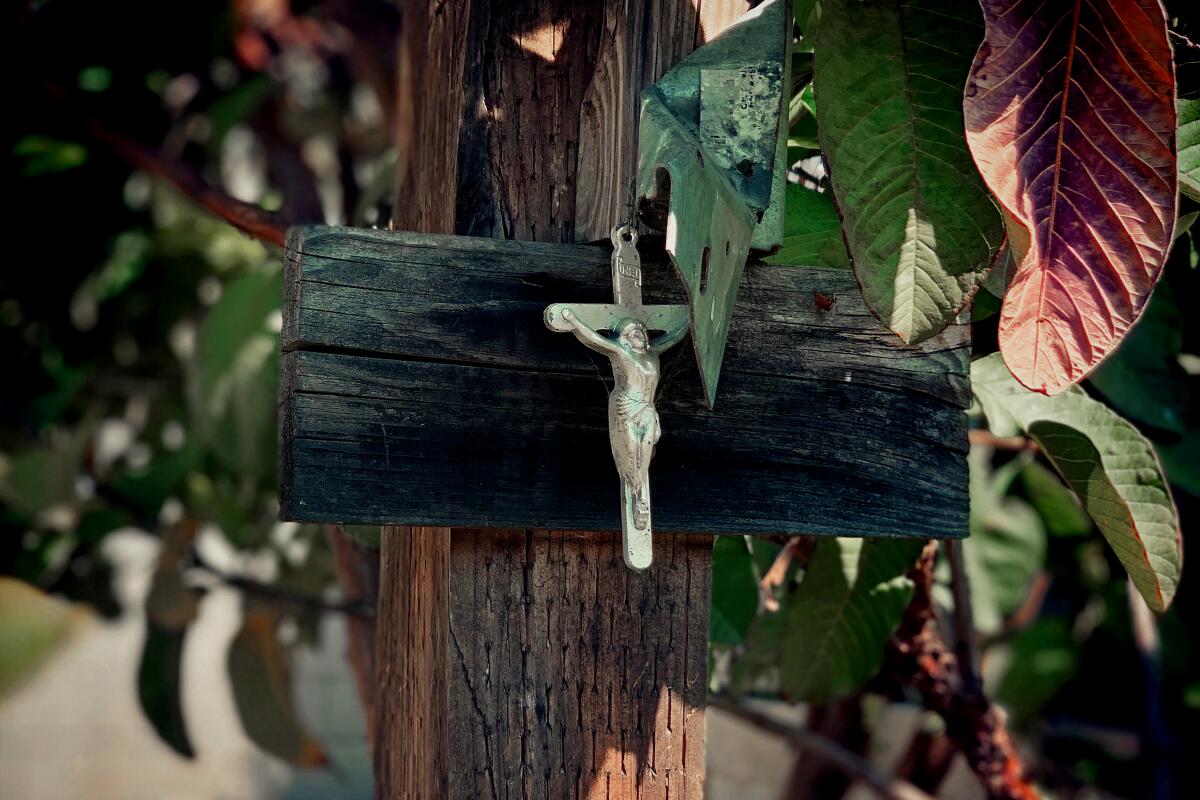Sheltering in place with lemons, guavas and a tiny backyard crucifix

- Share via
I live in El Sereno, in a neighborhood in Los Angeles where people blast cumbia music from opened living room windows on the weekends and a rooster wakes me daily at 5 a.m.
My partner and I bought our house three years ago, one of a few flipped houses on a block that’s creeping toward gentrification.
Our next-door neighbors — an older Mexican couple named Gonzalo and Mague — were close friends of the previous owner. When he died, his daughter inherited the house, installed new floors, recessed lighting and an updated kitchen. She didn’t put effort into the landscaping, however, so the property’s original roots show, especially in the backyard. There are broken slabs of concrete, a cracked retaining wall and an old fire pit gouged into the dirt. There’s also a scraggly guava bush and a large lemon tree.
We don’t spend much time back there except to pick lemons. One day, we were surveying the yard, making plans, envisioning gravel-paved walkways and beds of drought-tolerant plants, when we noticed a small silver crucifix, four inches long, nailed to a wooden post. We cracked jokes, accusing the other of tacking it there (we’re both lapsed Catholics). After all, we’d been living in the house for a while and hadn’t noticed it until then.
In our “Dispatches From the Pandemic” series, we bring you personal stories from people whose lives have been altered by COVID-19.
Since sheltering in place, I’ve been doing my part to keep an eye on Gonzalo and Mague, trying to calm the feelings of fear and helplessness that color my days. Last week, I picked them some lemons, placed these in a used Target bag and hooked it over the edge of the cinder-block wall separating our lots.
“I’ll stay back,” I shouted to Mague in Spanish.
“I make lemonade with chia seeds,” she explained. “Chia’s good for your health. I’ll leave you some. How are the guavas doing?”
“Good.”
A few months ago, before the coronavirus came to town, Mague and Gonzalo had come by to ask if they could pick some guavas. They admitted that they were worried we’d get rid of the fruit trees when we moved in.
“No,” I said. “They remind me of my mother.”
Mague held a guava in her hand and pointed to the tattoo of Our Lady of Guadalupe on my forearm. The previous homeowner was a devotee of La Virgen, and every year on Dec. 12, her feast day, he’d open the gate to the yard and all the neighbors would bring food. He’d hire a mariachi band to sing to her, and they’d gather at the beautiful altar he’d construct.
“Where was it?” I looked around, unable to fathom where something so elaborate could fit in a small yard.
“Around there.” Gonzalo pointed to the crucifix on the post. “It was always so pretty. All lit up.”
“This backyard was like our church,” Mague said.
These sleepless nights, lying in bed, anxious and unsure, I imagine all the neighbors out there, singing and eating by the glowing light of hundreds of veladoras, all their hands touching, their faces full of reverence and hope.
The trees and the tiny crucifix remain.
Alex Espinoza is the Tomás Rivera Endowed Chair of creative writing at UC Riverside. His latest book is “Cruising: An Intimate History of a Radical Pastime.”
More to Read
A cure for the common opinion
Get thought-provoking perspectives with our weekly newsletter.
You may occasionally receive promotional content from the Los Angeles Times.







